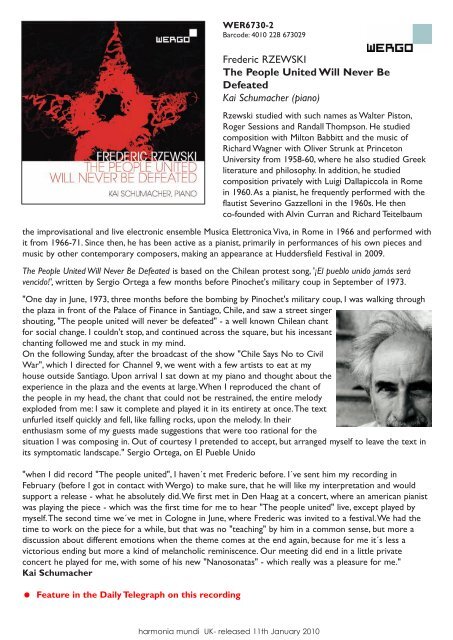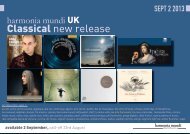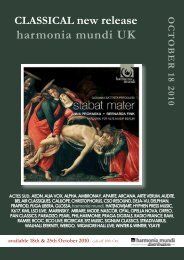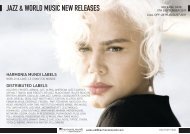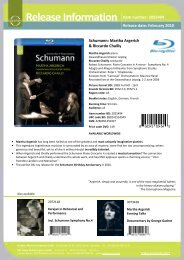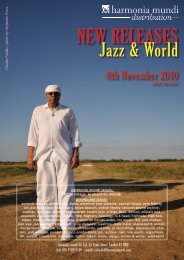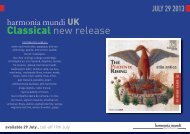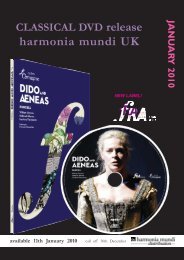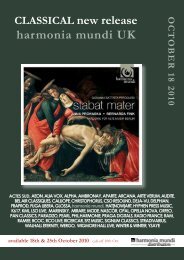CLASSICAL new release harmonia mundi UK available 11th ...
CLASSICAL new release harmonia mundi UK available 11th ...
CLASSICAL new release harmonia mundi UK available 11th ...
Create successful ePaper yourself
Turn your PDF publications into a flip-book with our unique Google optimized e-Paper software.
WER6730-2<br />
Barcode: 4010 228 673029<br />
Frederic RZEWSKI<br />
The People United Will Never Be<br />
Defeated<br />
Kai Schumacher (piano)<br />
Rzewski studied with such names as Walter Piston,<br />
Roger Sessions and Randall Thompson. He studied<br />
composition with Milton Babbitt and the music of<br />
Richard Wagner with Oliver Strunk at Princeton<br />
University from 1958-60, where he also studied Greek<br />
literature and philosophy. In addition, he studied<br />
composition privately with Luigi Dallapiccola in Rome<br />
in 1960. As a pianist, he frequently performed with the<br />
flautist Severino Gazzelloni in the 1960s. He then<br />
co-founded with Alvin Curran and Richard Teitelbaum<br />
the improvisational and live electronic ensemble Musica Elettronica Viva, in Rome in 1966 and performed with<br />
it from 1966-71. Since then, he has been active as a pianist, primarily in performances of his own pieces and<br />
music by other contemporary composers, making an appearance at Huddersfield Festival in 2009.<br />
The People United Will Never Be Defeated is based on the Chilean protest song, '¡El pueblo unido jamás será<br />
vencido!', written by Sergio Ortega a few months before Pinochet's military coup in September of 1973.<br />
"One day in June, 1973, three months before the bombing by Pinochet's military coup, I was walking through<br />
the plaza in front of the Palace of Finance in Santiago, Chile, and saw a street singer<br />
shouting, "The people united will never be defeated" - a well known Chilean chant<br />
for social change. I couldn't stop, and continued across the square, but his incessant<br />
chanting followed me and stuck in my mind.<br />
On the following Sunday, after the broadcast of the show "Chile Says No to Civil<br />
War", which I directed for Channel 9, we went with a few artists to eat at my<br />
house outside Santiago. Upon arrival I sat down at my piano and thought about the<br />
experience in the plaza and the events at large. When I reproduced the chant of<br />
the people in my head, the chant that could not be restrained, the entire melody<br />
exploded from me: I saw it complete and played it in its entirety at once. The text<br />
unfurled itself quickly and fell, like falling rocks, upon the melody. In their<br />
enthusiasm some of my guests made suggestions that were too rational for the<br />
situation I was composing in. Out of courtesy I pretended to accept, but arranged myself to leave the text in<br />
its symptomatic landscape." Sergio Ortega, on El Pueble Unido<br />
"when I did record "The people united", I haven´t met Frederic before. I´ve sent him my recording in<br />
February (before I got in contact with Wergo) to make sure, that he will like my interpretation and would<br />
support a <strong>release</strong> - what he absolutely did. We first met in Den Haag at a concert, where an american pianist<br />
was playing the piece - which was the first time for me to hear "The people united" live, except played by<br />
myself. The second time we´ve met in Cologne in June, where Frederic was invited to a festival. We had the<br />
time to work on the piece for a while, but that was no "teaching" by him in a common sense, but more a<br />
discussion about different emotions when the theme comes at the end again, because for me it´s less a<br />
victorious ending but more a kind of melancholic reminiscence. Our meeting did end in a little private<br />
concert he played for me, with some of his <strong>new</strong> "Nanosonatas" - which really was a pleasure for me."<br />
Kai Schumacher<br />
Feature in the Daily Telegraph on this recording<br />
<strong>harmonia</strong> <strong>mundi</strong> <strong>UK</strong>- <strong>release</strong>d <strong>11th</strong> January 2010


